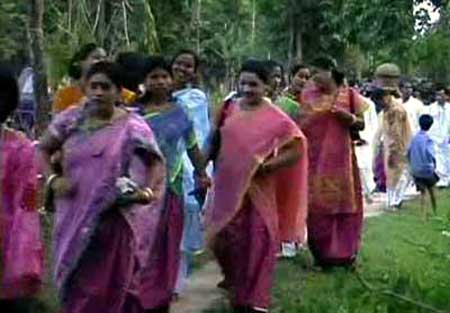
It’s been two hundreds or more years since our forefathers settled here from a beautiful place called Manipur and consequently they had developed a diverse identity for us. The identity of Bishnupriya Manipuri was a result of long historical process and series of struggles. For years we, bishnupriyas, meiteis and pangons are living here with a very close relationship and harmony as manipuris, as a undivided community. Though I take utmost pride of being a Manipuri, life has never been usual like other Bangladeshis here. I suffer the same side with other indigenous tribes living in political boundary of Bangladesh. If you are a non-bengali you are always 2nd class people here. Even if you are Hindu, you are 2nd class Hindu because you belongs to a marginal ethnic group. And I guess that is the same for hundred percent of the people belonging to Manipur or the other North Eastern states of India. As constitutionally the definition of ‘Indian’ or ‘Bangladeshi’ doesn’t include us, this is a price we indigenous tribes are forced to pay for national integrity.
The law of nature is ‘Survival of the fittest’, in a close ecosystem or forest where diverse population occurs; the dominantly populated species will always try to take maximum resources. If the resources are scare then they will try to eliminate the lesser-populated communities, thus extinction occur. This is similar to human being also. But there are so many people still our community who are sadly prone to disease of being copycap Bangalis, their role model has been some typical ‘Bengali Bhadaralok’. What gives me more shock is when educated people suffering from inferiority syndrome and usually try to ignore and hide their identity as a Manipuri. How to make these people realized that “you cant become the son of other mother, as she has her own sons”? How can people forget the endless struggles and sufferings our godly ancestors had gone through to develop a social structure, rules and regulations, economy system, an honest way of living and life leading, a unique dress code, a language to communicate and above all, to establish a proud identity for us?
If we ever tried to trace our roots we would hardly find it in history books. In the past years I have come across enough incidences and accounts that build up this immense anger and disappointment in me and I don’t understand where it will all go. In these years I have understood the importance of bringing our ever neglected history, culture, fine art, language and literature in front of the world. We have to make extra effort to find and preserve our glorious history and culture. Whatever little or more we know should be shared with everyone.
We are lucky to have portals, website and blogs like manipuri.org, pouri.org, bishnupriyamanipuri.blogspot.com etc and we should make the most out of it by contributing articles and other stuffs, which are related to our identity and culture to share it with everyone. I deeply appreciate these endeavors and my special thanks goes to the people responsible for bringing up such a wonderful sites.
Giving more importance to our own culture might seem too fanatical or selfish. One of my friends criticized me for not being interested about Bengali culture and not being stereotyped like wearing Saris and Lungi, listening Rabindra Sangit, talking in fluent Bengali, eating Meats, visiting Loknath baba ashrams or Durgabaris as well. She was shocked when I replied – “do you like to wear a Lahing or Inafi, can you talk Manipuri, do you eat Paltoi and Sinchou, do you bow down to Apokpa?” To that, naturally came, “You indigenous people are very selfish! You just think of your people, your culture, your identity.”
Well if we don’t think about our people or our culture will Superman fly in to save us?